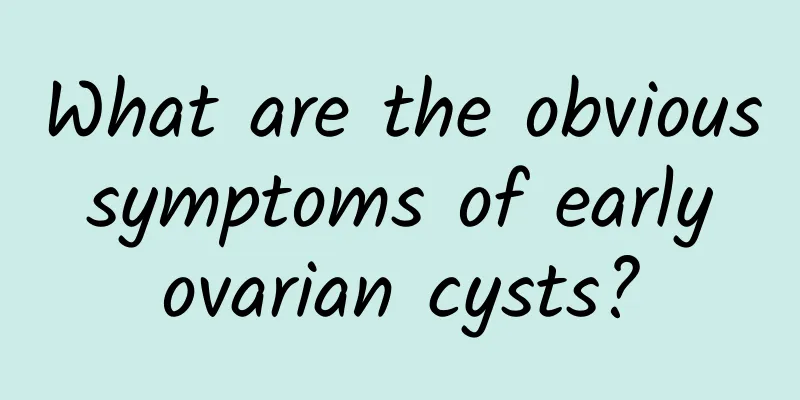Why do women suffer from threatened miscarriage?

|
Why do women suffer from threatened miscarriage? There are certain reasons for threatened miscarriage during pregnancy, and these reasons are relatively complicated. If you want to successfully preserve the fetus, you must pay attention to finding the main factors that cause threatened miscarriage. So what are the factors that cause women to have threatened miscarriage? Let's take a look together. What are the seven major causes of threatened miscarriage in women? 1. Genetic factors Many spontaneous miscarriages in early pregnancy are due to abnormal embryo development during pregnancy. For threatened miscarriages where no obvious cause has been found, expectant mothers should not blindly preserve the fetus, otherwise the babies born will have birth defects, which will bring heavy burdens to the family and society. 2. Endocrine factors For example, luteal insufficiency, polycystic ovary syndrome, hyperprolactinemia, thyroid disease, diabetes and other diseases may cause threatened abortion. 3. Reproductive organ malformation Such as uterine malformation, intrauterine adhesions and cervical incompetence. If there is cervical incompetence, cervical cerclage should be performed around 14 weeks of pregnancy to prevent miscarriage. In addition, do not do too many artificial abortions, which are the most damaging to the uterus and should be avoided. 4. Infection factors Some expectant mothers experience increased vaginal discharge in the early stages of pregnancy, but do not pay attention to it, which can lead to miscarriage. 5. Systemic diseases in pregnant women For example, chronic wasting diseases such as tuberculosis, high fever, anemia, heart disease, chronic kidney disease, and hypertension can affect the development of the embryo; severe malnutrition can also directly lead to miscarriage; smoking, drinking, and excessive caffeine intake are all high-risk factors for miscarriage. 6. Environmental factors Physical factors such as radioactive substances, high temperature, microwaves, noise, etc., chemical factors such as various metal substances such as mercury, lead, etc., chemical substances such as benzene, gasoline and organic pesticides, etc. are all high-risk factors for threatened abortion. 7. Immune factors With the research of modern science, immune factors such as abnormal antigen system, blood type antigen incompatibility, abnormal antibody system, abnormal autoantibody level are also one of the factors causing threatened abortion. In short, the above mainly introduces some of the main reasons for threatened abortion in women. No matter which of the reasons it is, it will cause women to have symptoms of threatened abortion. Some of them are caused by one factor, and some are caused by multiple factors. If pregnant women know more about these common sense, they can also avoid the occurrence of threatened abortion. |
<<: Important treatment methods for threatened abortion
>>: What is threatened miscarriage?
Recommend
Eating indiscriminately will cause your blood sugar, blood pressure and cholesterol to go out of control! Nutritionist: Seven-day sugar-reducing and muscle-building meals to get rid of obesity, exercise without anxiety
During this period, everyone stayed at home for e...
Eating winter melon can help you lose weight, reduce fat, treat cough and fight cancer
What do you think of when you hear the word winte...
What causes moderate cervical erosion? 4 causes of moderate cervical erosion
Cervical erosion is common among married women, b...
What to eat during menopause - healthy recipes
Women in menopause will gradually experience a de...
Will using belly button patches to slim you down? Chinese medicine doctor Zhang Wenxin: These 3 "lazy weight loss methods" are safer and more effective
Recently, a kind of "belly button patch"...
What to do if bacterial vaginosis occurs during menstruation
Gynecological inflammation is a very common disea...
Which department should I go to in the hospital for hyperprolactinemia?
Hyperprolactinemia is an endocrine disease, so yo...
What is the cause of vulvar itching and what medicine to use
What causes vulvar itching and what medicines to ...
What is the range of pelvic effusion?
What is the extent of pelvic effusion? Doctors po...
The ultimate way to lose weight through diet is to drink green tea after meals to promote metabolism
The best diet to end excess fat has three steps, ...
Key points of expert consensus on hyperprolactinemia
For a disease like hyperprolactinemia, the probab...
What's wrong with having menstruation several times a month?
What's wrong with having menstruation several...
Drinking ice water increases metabolism and helps lose weight? Chinese and Western perspectives say this...
A glass of refreshing ice water after exercise ca...
Does cervical erosion and hypertrophy affect pregnancy?
Cervical erosion and hypertrophy themselves usual...
Key points for regulating irregular menstruation for urban working women
Menstruation is a physiological phenomenon unique...









